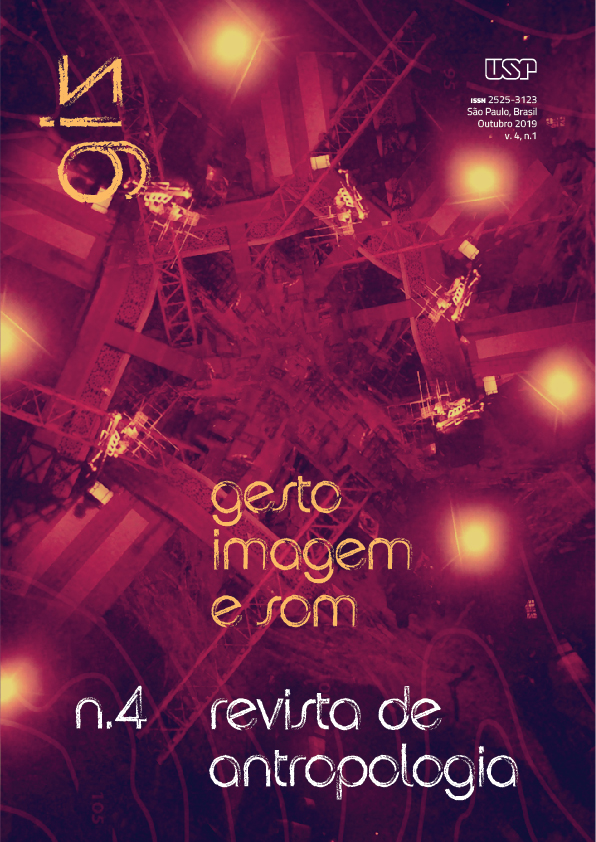Atlas: Matrix. Diary of a collaborative practice
DOI:
https://doi.org/10.11606/issn.2525-3123.gis.2019.152838Keywords:
Collaboration, Art, Anthropology, Lisbon, ColonialismAbstract
This short, experimental piece, represents one possible way to describe the site-specific installation ATLAS: MATRIX in the Tropical Garden of Belém in Lisbon, Portugal. The text is the narrative of a mindful collaboration, one where the act of collaborating - intentional but not overly planned - resulted in an open-ended installation/dispositive that called for ulterior collaboration, enabling the spectators to play with the elements while generating, at the same time, a reflection around the collaborative endeavour itself. An introductory story in the form of a diary is followed by DIY guidelines, indicating a replicable formula for co-laborating - [from Latin cum (together) + laborare (to practice)] - in transdisciplinary settings.
Downloads
References
Bishop, Claire. 2004. Antagonism and relational aesthetics. CUNY Academic Works, n. 110: 51-79, http://www.teamgal.com/production/1701/SS04October.pdf
Bishop, Claire. 2012. Artificial hells: participatory art and the politics of spectatorship. London & New York: Verso.
Coessens, Kathleen, Darla Crispin e Anne Douglas. 2009. The artistic turn: a manifesto. Leuven University Press.
De Luca, Francesca. 2018. “God was the first anaesthetist”: obstetrics and pain in Lisbon at the turn of the 20th century. Etnográfica, vol. 22, no. 3: 619-642.
Didi-Huberman, Georges. 2013. Atlas ou A gaia ciência inquieta. Lisboa: KKYM.
Elias, Helena. 2007. Arte pública e instituições do Estado Novo: arte pública das administrações central e local do Estado Novo em Lisboa: sistemas de encomenda da CML e do MOPC/MOP (1938-1960). Tese de doutorado, Universitat de Barcelona, Barcelona.
Elias, Helena. 2016. Livro dos sintomas II, sculpture installation at the Botanical Museum of Universidade de Coimbra. In VI Congresso da Associação Portuguesa de Antropologia, Coimbra, 1 a 3 jun. 2016.
Hunt, Nancy Rose. 2016. Preface. In Traces of the future: an archaeology of medical science in Africa, eds., Paul Wenzel Geissler et al, 9-13. Tousignant: Chicago Press.
Ingold, Tim. 2010. The textility of making. Cambridge Journal of Economics, no. 34: 91-102.
Matos, Patricia Ferraz de. 2006. As “côres” do império: representações raciais no Império Colonial Português. Lisboa: Imprensa de Ciências Sociais.
Ravetz, Amanda. 2005. News from home: reflection on fine art and anthropology. In Visualizing anthropology, eds., Anna Grimshaw e Amanda Ravetz: 69-79. Bristol & Portland: New Media Intellect.
Rich, Miriam. 2016. The curse of civilised woman: race, gender and the pain of childbirth in nineteenth-century American medicine. Gender & History, vol. 28, no. 1: 57-76.
Schneider, Arnd. 2015. Towards new hermeneutics of art and anthropology collaborations. Ethnoscripts, vol. 17, no. 1: 23-30.
Vargaftig, Nadia. 2016. Des empires en carton: les expositions coloniales au Portugal et en Italie (1918-1940). Madrid: Casa de Velázquez.
X. Andrade, Ana María Forero e Fiamma Montezemolo. 2017. Los trabajos de campo, lo experimental y el quehacer etnográfico. Íconos, vol. 21, no. 3: 11-22.
Downloads
Published
Issue
Section
License
Authors who publish in this journal agree to the following terms:
a. All rights reserved for authors. Journal has right to first publication. Work is simultaneously licensed under Creative Commons Attribution License which permits sharing work with recognition of authorship and initial publication in this journal for non-commercial ends.
b. Authors are authorized to separately make additional contracts for non-exclusive distribution of version of work published in this journal (e. g. publish in institutional repository or as book chapter), with recognition of authorship and initial publication in this journal.
Funding data
-
Fundação para a Ciência e a Tecnologia
Grant numbers SFRH/BD/93020/2013







